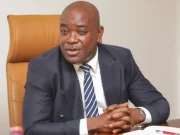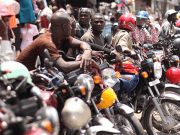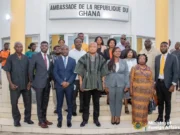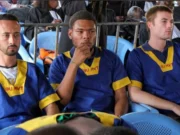Some major streets of Accra are now deathtraps for motorists and pedestrians alike as malfunctioning traffic lights have turned many intersections into chaotic scenes during peak hours.
A random check by the Daily Graphic team through the capital revealed that at least 123 traffic lights on 14 major routes in Accra were either not functioning, had poles without bulbs, or had their bulbs hanging on damaged poles.
The situation has left these intersections with regular heavy traffic that usually requires the presence of police traffic wardens.
Heavy traffic
The Department of Urban Roads says it is finding it difficult to cope with the extent of damage to traffic lights in the capital, blaming human factors for the current situation.
When contacted, the Department of Urban Roads did not seem to have any remedy in sight as it maintained that it was more expensive repairing traffic lights than installing new ones.
Responsible factors
The Road Safety Engineer of the Department of Urban Roads, Pat Onny, told the Daily Graphic that the traffic lights situation had been caused by a combination of theft of some important components, vandalisation – including fires and rodents – and vehicular accidents.
Ms Onny explained that majority of the underground electrical cables of the traffic lights were either stolen or damaged by rodents due to poor sanitation around the traffic lights, while motor accidents had also destroyed some.
She said it was expensive repairing traffic lights, especially where certain components were missing, stressing that the maintenance cost of the vandalised traffic lights was more than the cost of the initial installation.
A traffic light knocked down by a vehicle at Ablekuma Pentecost Junction
She said it was difficult to locate some cables in places such as the Graphic Road due to the choked gutters in the area.
She further explained that some of the essential components, including cables kept in the controller chambers along the streets, had been damaged by fire sometimes set by residents and hawkers to burn rubbish.
“Most of them even go to the extent of burning rubbish in the controller chambers, thinking they are empty chambers, destroying the cables connected to the traffic lights,” she noted.

She said frequent power outages had also caused the malfunctioning of some traffic lights.
Ms Onny said the department was considering various measures, including fixing burglarproof bars around the controllers or installing rubber or fibre composite covers on the chambers to secure traffic light installations.
Alternatively, she said the department might resort to solar power to contain the effects of power outages and fluctuations on the traffic lights.
Situation
The malfunctioning lights are in different categories.
While some have both amber and green working simultaneously, others have one or two of the bulbs being burnt out, making it difficult for pedestrians, especially schoolchildren, to cross the road.
It was also observed that some intersections had traffic light poles without bulbs, while others featured tilted poles with the bulbs falling off.
A malfunctioning traffic light at La Bawaleshie
The traffic lights at the Bishop’s Girls’ Basic School, Absa Bank and the old AMA Office, all on the J.E.A. Mills High Street, were also not left out.
The Shangri-La Hotel intersection on the Liberation Road, for instance, summarises the frustration of commuters.
Other affected intersections include the CMB Market, Graphic Road, Trades Union Congress (TUC) head office on the Liberia Road, Barnes Avenue, Kinbu Road, Starlets ‘91 Road, Nationalism Park, Kanda Highway/Johnson Sirleaf Road, Achimota New Station, and Barn Yard at Awoshie.
The rest are Independence Avenue, Kanda Highway/Castle Road, J.J Rawlings Avenue, Trinity Avenue/Freetown, American House bus stop on the Boundary Road/Freetown, and Awoshie-Pokuase Road/Assemblies Junction.
To contain the situation, city guards and police personnel are usually deployed to some of the affected areas to mitigate the impact of the non-functioning and malfunctioning traffic lights.

Concerns
A motorcyclist at the Kinbu intersection, who spoke to the Daily Graphic on condition of anonymity, said the faulty traffic lights often created congestion as road users manoeuvred to have the right of way.
He appealed to the Department of Urban Roads to fix the faulty traffic lights to enhance business and reduce time spent in traffic.
A lottery agent, who gave his name as Paa Kwame, also said the faulty traffic lights had led to pedestrians crossing the road haphazardly.
“I believe the faulty traffic light is the reason pedestrians cross the roads anyhow, and one of these days it might lead to bad news,” he said.
For some students of the Accra Technical University (ATU), crossing the road to their destination was a high risk as it sometimes took more than five minutes for speeding vehicles to stop for them to cross to the other side.
A falling traffic light along the Liberation Road
“It is good to have functional traffic lights because in their absence, using the road is difficult for first timers, especially, and not all drivers would be willing to stop for pedestrians,” a student noted.
A National Service person with the Ghana Police Service stationed at the Barn Yard intersection at Awoshie described the faulty traffic lights situation as frustrating for traffic wardens because personnel assigned to the affected intersections were required to conduct traffic for close to five hours.
She stated that they had to start directing traffic from as early as 6 a.m. to as late as 9 p.m. to ensure the safety of motorists and pedestrians.
“Most drivers do not respect the fact that we are also humans controlling the traffic; some tend to violate the rules and drive past us,” she bemoaned.
She, however, explained that after 9 p.m., some residents usually volunteered to continue directing traffic till the situation improved.
“If people do not continue after we close, I’m sure we will record a lot of accidents,” she added.
A taxi driver stationed at the Achimota New Shell Station, Samuel Tetteh, intimated that the traffic lights in that area had been faulty for about two years.
He said the police regularly came by early in the morning to direct traffic but left by 9a.m. only to reappear in the evening when there was an accident or heavy vehicular traffic.
“Our voices are not heard enough when it comes to road traffic. Moreover, this is a very busy road and so much attention is needed here,” he appealed.
Other drivers at the station lamented the absence of traffic lights vis-a-vis the frequent accidents on that stretch.
The situation was not different at the University of Ghana Business School bus stop where drivers bemoaned the defective traffic lights which had been out of order for more than two years.
“Human beings cannot direct vehicles as traffic lights can, so it will be best if they fix the lights to reduce the accidents that occur here,” a taxi driver said.
“The police do not come here to direct traffic, hence there is always an accident,” a car dealer at La Bawaleshie complained bitterly.










































